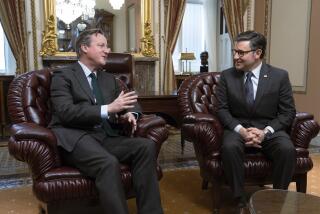For Ulster Peace Prospects, Washington Is Key
- Share via
WASHINGTON — All the players in the once-violent Northern Ireland conflict are heading to Washington these days in hopes that the White House can help ease them past a critical impasse in their peace negotiations.
By all accounts, they are receiving a simple message from President Clinton and his advisors: Speed up, don’t slow down.
That message is evidently more appealing to the Irish government and the Irish Republican Army than to the British government and the Protestant Unionists. But the Americans are still regarded as the most impartial brokers around. The Roman Catholic-led IRA and the Protestant-led militias agreed to a cease-fire in August 1994, after 25 years of bloodshed.
Both Michael Ancram, a British junior minister with responsibility for Northern Ireland, and Gerry Adams, the leader of Sinn Fein, the political movement close to the IRA, came to Washington this week. Irish Foreign Minister Dick Spring is scheduled to arrive next week, and leaders of the Unionists are expected a week after that.
Describing the role of Clinton administration officials, Irish Ambassador Dermot Gallagher said: “They listen and facilitate. They nurture the peace process. Sometimes they receive messages from different sides and convey them to the other side. Sometimes they may see where a bridge may exist between two sides. They’ve been very successful.”
*
The White House wants the antagonists to open comprehensive negotiations--what are known as “all-party talks”--before the end of this month as originally planned. But the impasse seems too rigid to allow the talks to begin by then.
“I don’t see it,” said Andrew J. Wilson, who teaches Irish history at Loyola University in Chicago and has just published a book about U.S. policy toward Northern Ireland. “The prospect of this [all-party talks] happening before the end of February is extremely remote.”
Whatever the outcome, Clinton, who visited Northern Ireland in November, is receiving high praise from Irish-American leaders.
“I’m a 95% Republican conservative,” said Rep. Peter T. King of New York. “But I believe that Bill Clinton has done more for peace in Ireland than any other president in American history.”
Clinton’s policy of taking an active part in the peace process is a departure from the past, when American presidents did little but passively support British policy on the issue.
Adams, talking with reporters in Washington over breakfast, said he told Clinton and White House National Security Advisor Anthony Lake this week that “if the president had listened to the British during this whole period, there wouldn’t be a peace process today.”
The six counties of Northern Ireland are located on the same island as the Republic of Ireland but are part of Britain. The Catholic-dominated IRA has fought for years, often employing terrorism, to unite the counties with Catholic Ireland. But the majority Protestants want to remain part of Britain.
The latest impasse is over the recommendations of an international commission, headed by former Senate Majority Leader George J. Mitchell (D-Maine), that all-party peace talks begin as soon as possible--without the participants waiting for the IRA to disarm, as Britain has demanded.
But British Prime Minister John Major threw in a new proposal--that elections take place in Northern Ireland to determine who will take part in the all-party talks.
*
The Clinton administration was careful in its reaction to the Major proposal, indicating that elections could be discussed in indirect meetings so long as the discussions did not delay the start of all-party talks at the end of February.
Some analysts believe that the cool reaction from the White House has given the Major government second thoughts about the election proposal, but this is not clear. Major still must worry about his parliamentary majority.
Asked if he knows what the White House is up to, Adams told reporters: “I find it difficult sometimes to figure it out.”
Times Washington Bureau Chief Doyle McManus contributed to this report.
More to Read
Sign up for Essential California
The most important California stories and recommendations in your inbox every morning.
You may occasionally receive promotional content from the Los Angeles Times.












